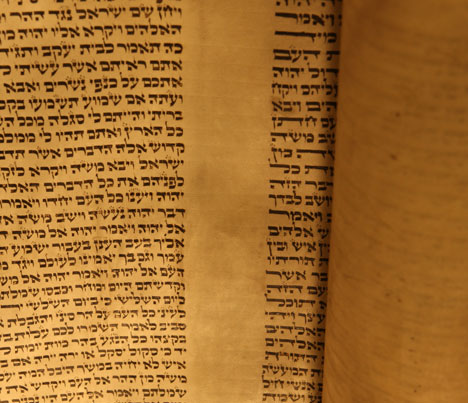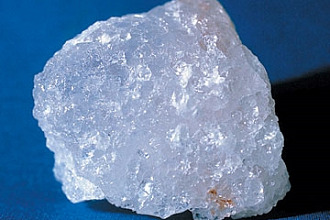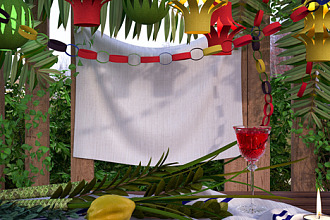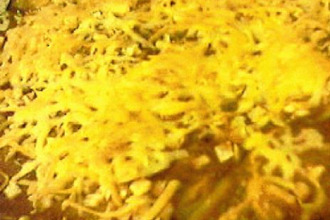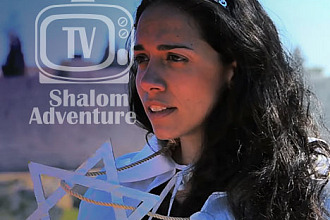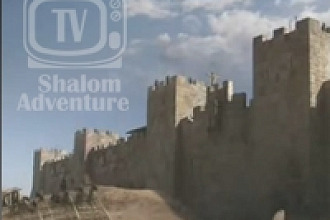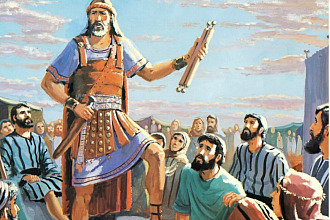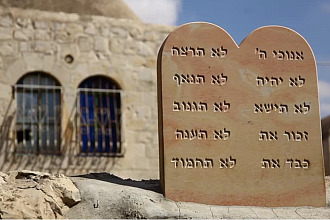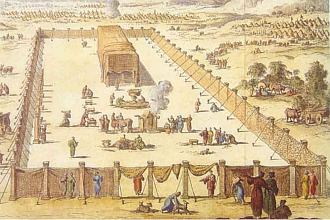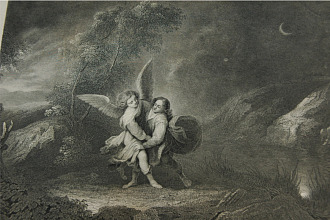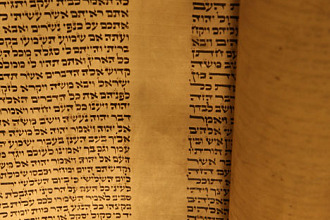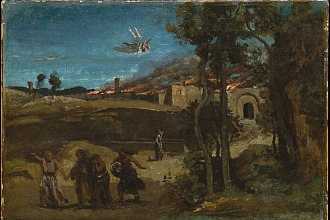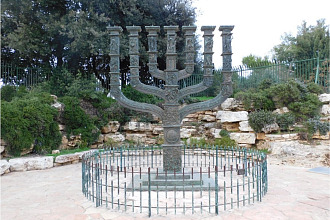Parasha for the Week: Beshalach: Exodus 13:17 – 17:16
Haftarah for the Week: Judges 4:4 – 5:31
Besorat Yeshua: Mark 14:45 - 59
Overview
Pharaoh finally sends Bnei Yisrael out of Egypt. Pillars of cloud and fire, leads them toward Eretz Yisrael on a circuitous route, avoiding the Pelishtim (Philistines). Pharaoh regrets the loss of so many slaves and chases the Jews with his army. The Jews are very afraid as the Egyptians draw close, but G-d protects them. Moshe raises his staff and G-d splits the sea, enabling the Jews to cross safely. Pharaoh, his heart hardened, commands his army to pursue, whereupon the waters crash down upon the Egyptian army. Moshe and Miriam lead the men and women, respectively, in a song of thanks. After three days' travel only to find bitter waters at Marah, the people complain. Moshe miraculously produces potable water. In Marah they receive certain mitzvot. The people complain that they ate better food in Egypt. G-d sends quail for meat and provides manna, a miraculous bread that falls from the sky every day except Shabbat. On Friday a double portion descends to supply the Shabbat needs. No one is able to obtain more than his daily portion, but manna collected on Friday suffices for two days so the Jews can rest on Shabbat. Some manna is set aside as a memorial for future generations. When the Jews again complain about a lack of water, Moshe miraculously produces water from a rock. Then Amalek attacks. Joshua leads the Jews in battle while Moshe prays for their welfare.
"Shabbat Shira (of song)"
The Torah tells us that after letting them go, "The heart of Pharaoh and his servants changed toward the people, and they said: 'What is this that we have done, that we have let Israel go from serving us?'" Pharaoh and his men pursued the Children of Israel and caught up to them by the sea. Trapped between the sea and Pharaoh's army, the Torah states, "The Children of Israel lifted up their eyes and, behold the Egyptians were marching after them; and they feared exceedingly, and the Children of Israel cried out to G-d..." Moshe prayed and G-d responded, "Tell the Children of Israel that they go forward. Lift up your rod and stretch out your hand over the sea, and divide it and the Children of Israel shall go into the sea on the dry ground." When the Egyptians saw the Jews escaping, they gave chase. When the last Jew reached dry land, the waters returned and the Egyptians drowned. After crossing through the sea and seeing their enemies drown, their faith was greatly strengthened. "And Israel saw the great hand with which the L-rd brought upon the Egyptians and the people feared the L-rd; and they believed in the L-rd and in Moshe his servant. Then Moshe and the Children of Israel sang this song unto the L-rd." The song which Moshe and the Israelites sang after crossing the sea begins with "Az Yashir." What is the daily lesson of "Az Yashir"? The Exodus from Egypt wasn't complete until they were rid of the Egyptians. This occurred only after they crossed the sea. Thus, the song of Az Yashir represents the culmination of the Exodus. The Torah commands us, "Remember the Exodus each day of your life."
"Manna Day by Day"
The Rabbis asked this question: why did G-d make the Jewish people collect Manna day by day? There is two lessons we can draw from the story of the Manna.
1. After being enslaved by the Egyptians for so many years, G-d wanted to strengthen their faith in Him and their "Bitachon"—reliance and dependence on G-d. Rather than storing food from one day to the next, the Jewish people had to rely on G-d each day for their sustenance. Rabbi Yishmael states in the Midrash, "From this we learn that whoever has what to eat today but says, 'What will I eat tomorrow?' lacks faith in G-d; for the Torah specifically tells us that the Manna came down daily in order to test them whether the people will have faith." Our daily sustenance comes from heaven. Also, the fact that G-d doesn't give us our needs all at once for the rest of our lives, shows His love toward us, so that we should continuously look up to Him. This enforces our relationship with Him!
2. The second lesson is about our daily spiritual sustenance, we cannot live only with natural food, we also need spiritual food as Moshe Rabenu said, "man does not live on bread alone, but that man may live on anything that comes from the mouth of the L-RD" (Deut 8:3). The Word of G-d should be our daily spiritual bread.
"Sing G-d's Praise"
G-d's miracles affect each of us every second of our lives. Life itself is a continuos miracle. Remembering this gives us a very different outlook on life and G-d's relationship towards us. Thus, each day we are reminded of this great miracle of miracles and we "sing" G-d's praise
"Speak Out for Me"
First they came for the Communists, but I was not a Communist so I did not speak out. Then they came for the Socialists and the Trade Unionists, but I was neither, so I did not speak out. Then they came for the Jews, but I was not a Jew so I did not speak out. And when they came for me, there was no one left to speak out for me (Martin Niemoeller, protestant theologian put in the Dachau concentration camp by nazis).
"Day by Day"
Someone asked Rabbi Shimon bar Yochai, "Why did they have to collect the Manna each day?" Rabbi Shimon replied: A king had a son. In the beginning of the year, the king would give his son all that he would need for the entire year. As a result, the son would visit his father only once a year. The king wasn't happy with this so he decided to provide food for his son one day at a time. From then on, the son appeared before his father each day! "The same was with Israel," explained Rabbi Shimon. "By having to depend upon G-d for their sustenance each day, the people of Israel were compelled to direct their hearts to their Father in heaven every day!"
"A Perfect Faith"
A man asked Rabbi Yisrael Salanter, "if I have perfect faith in Hashem, will He provide me with all my needs?" Rabbi Salanter affirmed. "Yes, if one has perfect faith in God, He will provide all His needs." "Then I need no longer work. I will rely on my faith, and the $20,000 that I'll need to survive will come to me in full!" The man went home and began to study Torah. After one week when the money did not appear he returned to the Rabbi to complain. "I have the faith and so far no money has arrived!" Rabbi Yisrael replied. "I will offer you $8,000 cash today if you will give me the $20,000 that you are sure will come to you because of your faith." The man jumped from his chair. "$8,000! Sure! I'll take it." Rabbi Salanter smiled and said, "Obviously you have more faith in my $8,000 then in Hashem's $20,000!"
Haftarah: Judges 4:4 – 5:31
Haftarah: The text of the Haftara is about Debo¬rah one of the prophetess of the Bible: "At that time Deborah, a prophetess, wife of Lappidoth, was judging Israel." (Judges. 4:4).
Parasha: In the parasha we have the description of another prophetess, Miriam. It is said: And Miriam sang to them: "Sing to the LORD, for he has tri¬umphed gloriously; horse and rider he has thrown into the sea." (Exodus 15:21). God uses men and women to reveal his will.
Haftarah: Exactly as Miriam was a great support for Moses, Deborah supported Barak, the chef of the army of Israel: "Deborah said to Barak, "Up! For this is the day on which the LORD has given Sisera into your hand. The LORD is indeed going out before you." So Barak went down from Mount Tabor with ten thousand warriors following him. And the LORD threw Sisera and all his chariots and all his army into a panic before Barak; Sisera got down from his chariot and fled away on foot." (Judges. 4:14-15).
Parasha: When God gave His victory over the Egyptians Miriam sang: "I will sing to the LORD, for he has triumphed gloriously; horse and rider he has thrown into the sea (Ex. 15:1).
Haftarah: When God gave His victory over Sisera Deborah sang: "When the people offer themselves willingly— bless the LORD! (Judges 5:1-2) "Awake, awake, Deborah! Awake, awake, utter a song! Arise, Barak, lead away your captives. (Judg. 5:12) "In ancient times the Lord had connected with His work men of varied talents. Abraham, Isaac, Jacob, Moses with his meekness and wisdom, and Joshua with his varied capabilities were all enlisted in God's service. The music of Miriam, the courage and piety of Deborah, the filial affection of Ruth, the obedience and faithfulness of Samuel—all were needed." (EGW)
Besorat Yeshua Mark 14:45 – 59
It is tu-bish vat, the new year of the trees, just a few weeks from Passover. Our reading in the gospel of Mark coincides with the Passover and death of the Mashiach on the tree at Golgotha.
Besorah: Yeshua is arrested: The disciples want to defend him: "one of those who stood near drew his sword and struck the slave of the high priest, cutting off his ear" (Mark 14:46,47) But Yeshua knows that he has to accept his destiny and stopped the disciples: "Have you come out with swords and clubs to arrest me as though I were a bandit? Day after day I was with you in the temple teaching, and you did not arrest me. But let the scriptures be fulfilled." (Mark 14:48-49). He did not come to fight the Romans to deliver Jerusalem. What a disappointment for the disciples! They were sure that Yeshua was the Mashiach, the one who will deliver Jerusalem from the Romans. They don't understand: "All of them deserted him and fled." (Mark 14:50). What a disappointment for the disciples! They were sure that Yeshua was the Mashiach, the one who will deliver Jerusalem from the Roman army. They don't understand, they leave him: "All of them deserted him and fled." (Mark 14:50). Yeshua is innocent: "the chief priests were looking for testimony against Y'shua to put him to death; but they found none. many gave false testimony against him, and their testimony did not agree..." (Mark 14:55-59)

